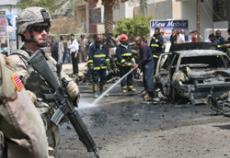
This Labor Day weekend was filled with several interesting numbers. The Toyota WEBN Fireworks that rocked the otherwise tranquil Sunday evening celebrates not only an extra day away from the grueling nine-to-five, but the show’s 30th anniversary as well. Labor Day is even older, having given the average Joe an annual break from the grindstone for 124 years.
But other, more solemn, numbers appeared this holiday weekend. CNN reported Sept. 3 that the number of American troops killed in the War in Iraq and the War on Terror reached 2,974, officially surpassing the number killed in the terrorist attack of Sept 11, 2001.
Of those 2,974, 329 are Americans who have died in Operation Enduring Freedom since October 2001, mostly in Afghanistan.
However, the remaining 2,645 of America’s fallen sons and daughters were lost in that chaotic maelstrom of a country, Iraq. Not surprisingly, Americans don’t like Americans dying. In a poll Sept. 4 from CNN, 35 percent of Americans favored the Iraq War. Sixty-one percent oppose the war, the highest figure in any CNN Iraq poll.
Two-thirds of Americans don’t like the war in Iraq, and I can’t say I blame them. Especially considering those 2,645 deaths are only part of the story. Nearly 20,000 Americans have suffered injuries in Iraq, with almost 9,000 not returning to duty.
Obviously, this conflict has touched many families. One needs only to look locally to find those who have lost loved ones to the Iraq War.
Matthew Maupin’s family can speak on how the war can change lives, as can the families of Lance Cpl. Brett Wightman, Lance Cpl. Timothy Bell Jr. and so many others. The tri-state region has experienced the harsh costs of going to war as its own soldiers have given so much, in some cases everything, to the war.
But the new poll data shows most Americans are fed up with paying the price for ‘peace.’ The nightly news mentioning new casualties in Iraq has, understandably, exhausted and frustrated many Americans to the point that they want to get out of Iraq faster than a football player would leave a Star Trek convention.
But that would be a very bad idea.
I seldom agree with President George W. Bush. I certainly didn’t agree with his decision to invade, or should I say liberate, Iraq. But pulling out now would be a ghastly mistake.
I think many Americans want to return to the idyllic ’90s, where Congress was too embroiled with a stain on a dress and who put which cigars where to do any lasting legislative harm. A time when Saturday Night Live was still kind of funny and terrorism didn’t crop up in everyday conversation. A time when we had a president who had smoked pot and played the saxophone instead of starting wars and pulverizing countries.
A time when War in Iraq was just a two month skirmish, not a grueling battle of attrition.
But that time has passed. Now, terrorism does come up in conversations. Americans do have to confront terrorism on a battlefield, and that battlefield is Iraq. No, we’re not fighting them over there so we don’t have to fight them over here. If we were, then the London and Madrid bombings, as well as the recent foiled airline attack, would never have happened.
We are fighting them now so that, later on, we don’t have to fight a true armed rogue nation.
You know, the type of rogue nation that Bush claimed Saddam’s Iraq was.
Leaving Iraq now would embolden the terrorists and give them their ideal home; an ungoverned territory with plenty of recruits and refuges. The Iraqi joke of a government, which is on the brink of a civil war over its national flag, would provide easy prey for fanatical terrorists. Iraq, with its millions of impoverished people, would present fertile recruiting and training grounds if abandoned by the country that claimed to be helping them. With the zealots of Iran to the east and the despots of Syria to the west, a fledgling parliament with no credibility among its constituents would fall quickly.
But most of all, what would you tell those who sacrificed their sons, daughters, sisters, brothers, mothers and fathers? That they died to overthrow one dictator and then abandon Iraq to another?
No, let’s not add to the somber list. It doesn’t need another disheartening number, the day Iraq’s democracy fails. The list is already too long.

